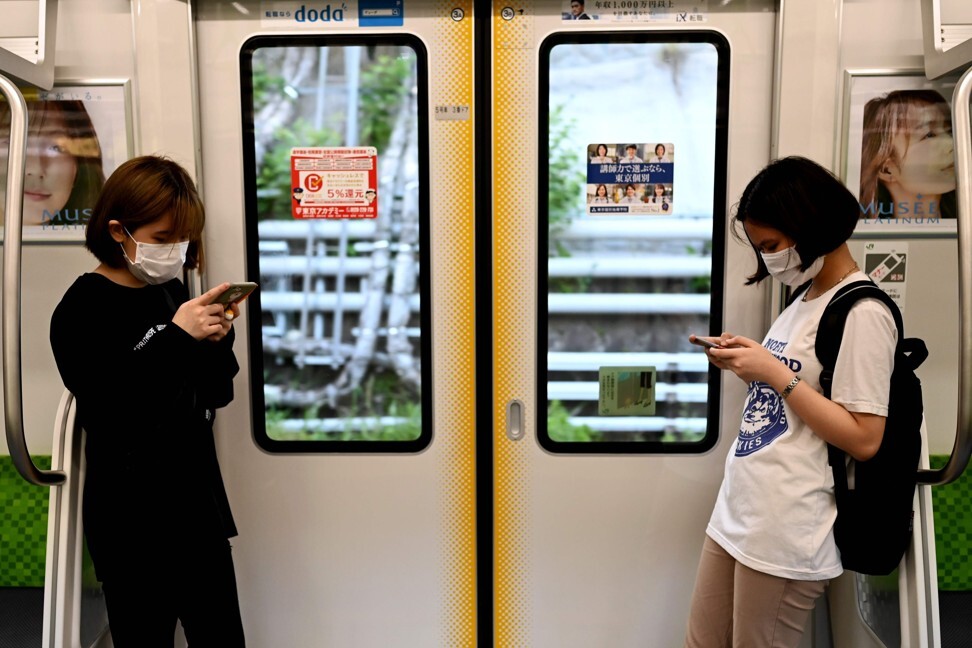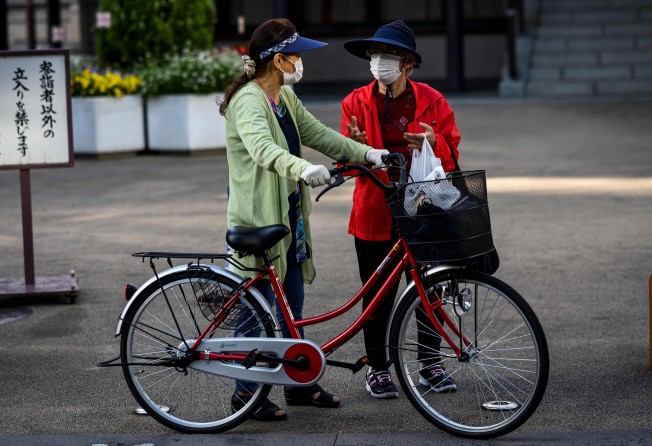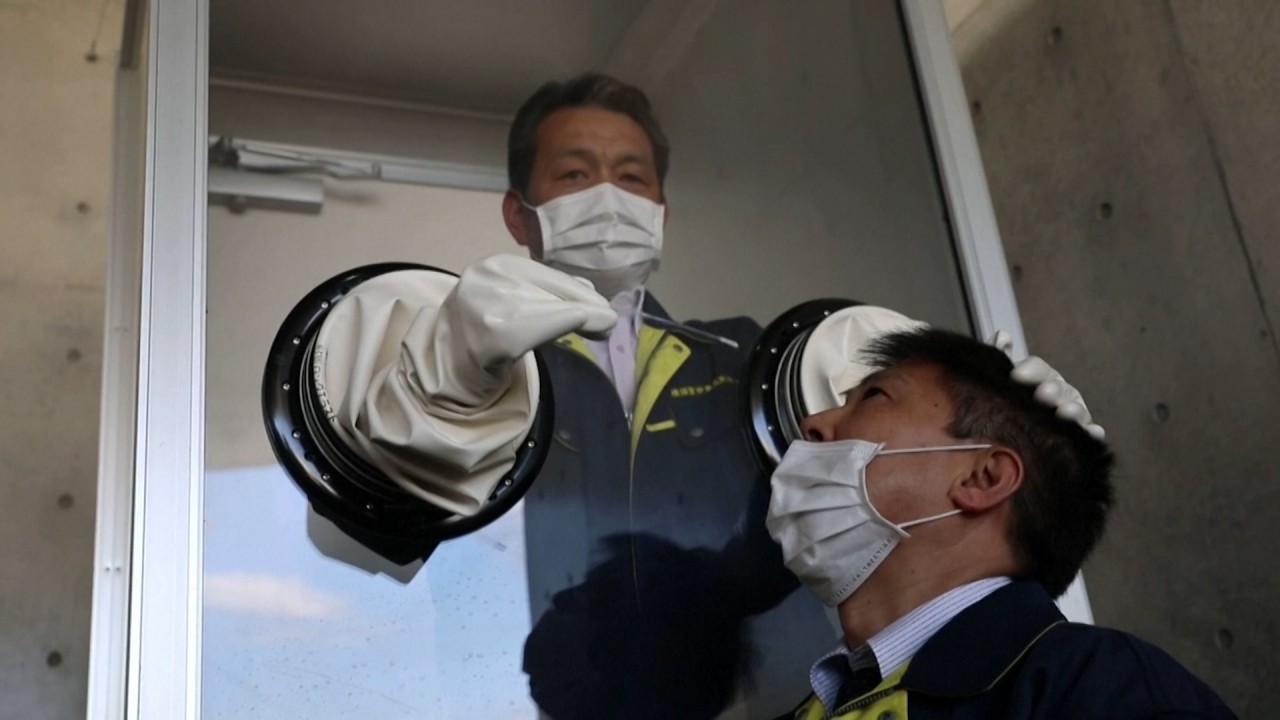
Coronavirus: Japan lifts state of emergency nationwide, considers US$930 billion stimulus plan
- Safe distancing curbs were removed for most of Japan on May 14 as new infections fell but the government had kept Tokyo and four other prefectures under watch
- ‘We had very stringent criteria for lifting the state of emergency,’ PM Shinzo Abe said. ‘We have judged that we have met this criteria.’

Japan Prime Minister Shinzo Abe on Monday lifted the state of emergency imposed nationally to combat coronavirus following a sharp decline in the number of new cases.
“We had very stringent criteria for lifting the state of emergency. We have judged that we have met this criteria,” Abe told a nationally televised news conference. “Today we will lift the state of emergency nationwide.”
Economy Minister Yasutoshi Nishimura laid out the plan on Monday at the opening of a meeting of a government advisory panel, setting off a process to lift the measure for the areas still under the decree, a week ahead of schedule.
“There is no longer a need for a state of emergency in any part of the country,” Nishimura said. “We would like to seek advice on lifting the emergency.”
Social distancing curbs were removed for most of the country on May 14 as new infections fell, but the government had kept Tokyo and four other prefectures under watch.
Tokyo Governor Yuriko Koike has said the capital would swiftly move into “stage one” of the lifting of curbs if the government ends the state of emergency. That would allow libraries and museums to reopen, and restaurants to stay open until later in the evening. Subsequent stages would see theatres, cinemas and fairgrounds reopen.
Tokyo reported 14 new coronavirus cases on Sunday, the highest since May 16, after just two cases were confirmed on Saturday. The total for the past seven days is 50, below the threshold of 70, or 0.5 people per 100,000, which the government has outlined as being needed to lift the emergency.
Abe lauded Japan’s success in flattening the curve, saying the country “was able to show the strength of the so-called Japan model”. But he warned that people would have to adapt to a “new normal” and continue to avoid the “three Cs”: closed spaces, crowded places and close contact.
“If we lower our guard, the infection will spread very rapidly... we need to be vigilant,” he said. “We need to create a new lifestyle; from now on we need to change our way of thinking.”
Tokyo, with its surrounding prefectures of Chiba, Kanagawa and Saitama, has a combined population of about 35 million people and an annual output of 182.2 trillion yen (US$1.7 trillion), which in global terms would make it the 11th-largest economy on the planet.
To support an economy on track for its deepest slump in post-war history, the government is considering fresh stimulus worth 100 trillion yen (US$930 billion), mostly comprising financial aid for companies, the Nikkei newspaper said.
The package, to be funded by a second supplementary budget, would follow a record 117 trillion yen spending plan deployed last month.
The combined spending would bring the total stimulus in response to the pandemic to about 40 per cent of Japan’s gross domestic product.
The new package includes 60 trillion yen to expand loan programmes that state-affiliated and private financial institutions offer to firms hit by virus, the Nikkei said. Another 27 trillion yen would be set aside for other aid including capital injections for ailing firms, the paper said.
The government is expected to approve the budget, which will also include subsidies to help companies pay rent and wages, at a cabinet meeting on Wednesday.

01:32
Japan expands walk-through and drive-through Covid-19 test sites to gauge scale of outbreak
Japan’s economy slipped into recession in the last quarter, and analysts expect another 22 per cent contraction in April-June.
The deepening pain from the pandemic is forcing the government to add to Japan’s huge debt pile, which is already twice the size of its economy, to pay for big spending plans.
While Japan has suffered far fewer coronavirus infections and deaths than any of its Group of Seven peers, Abe’s handling of the outbreak has reinforced concerns that his government has grown complacent after seven years in power. He has been criticised for delaying an emergency declaration when local cases began to surge and for being slow to close Japan’s borders to Chinese visitors.
Support for Abe’s cabinet slumped to 29 per cent, the lowest since he took office in 2012, in a poll published on Monday by the Asahi newspaper. Another survey published by the Mainichi newspaper showed approval had plunged 13 percentage points in less than four weeks to 27 per cent, according to a poll released by the Mainichi newspaper on Saturday.
Any level below 30 per cent is traditionally seen as a danger zone for the government. Disapproval surged 19 percentage points to 64 per cent in the Mainichi survey.
Meanwhile, Abe has vowed to work with regional governments to prepare for a second wave of infections that experts say is almost inevitable.
Additional reporting by Agence France-Presse